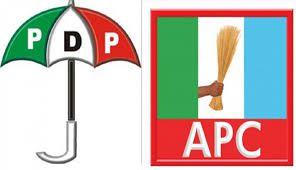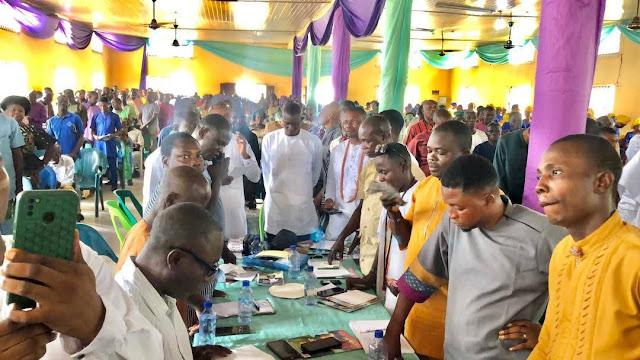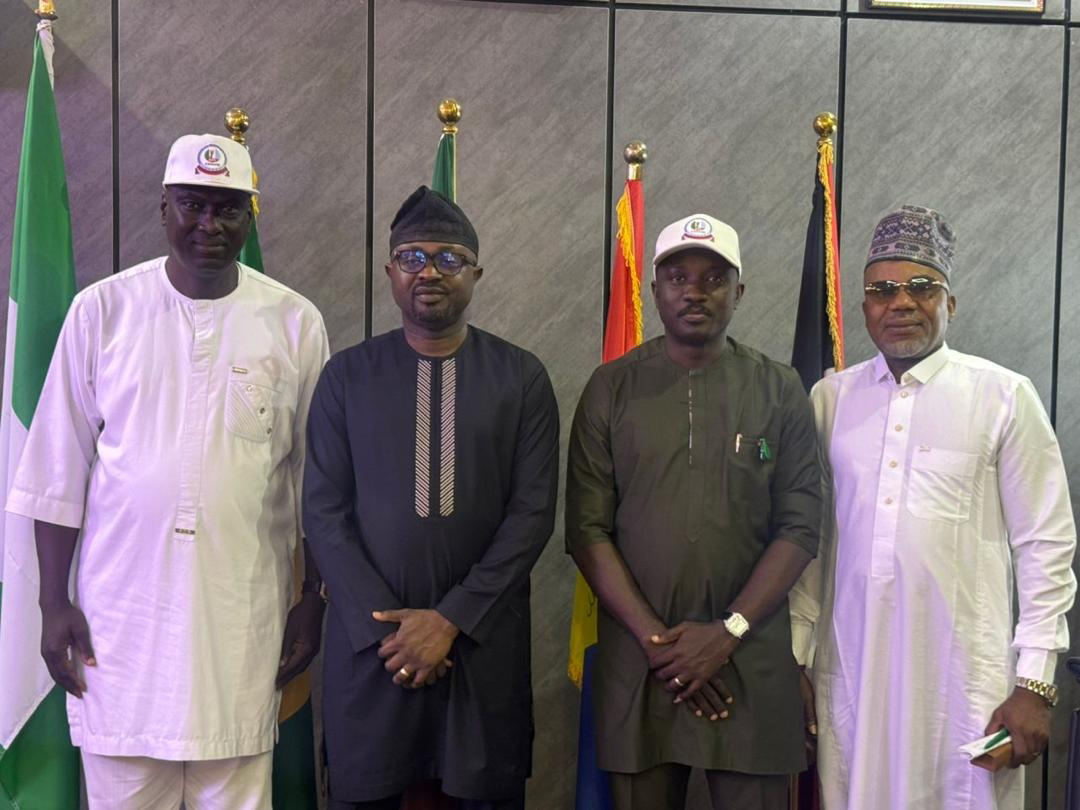In Osun State, Nigeria, political tensions have reached a boiling point as the All Progressives Congress (APC) and the Peoples Democratic Party (PDP) engage in a heated exchange of accusations over alleged plans to attack the Independent National Electoral Commission (INEC) office in Osogbo. The controversy, which has gripped the state’s political landscape, centers on claims by the PDP that the APC is orchestrating a plot to destabilize the region by targeting INEC’s facilities, particularly to destroy Bimodal Voter Accreditation System (BVAS) machines used in the July 16, 2022, governorship election. The APC has vehemently denied these allegations, accusing the PDP-led state government of fabricating claims to discredit its opponents and incite unrest. This escalating feud, reported on September 5, 2025, threatens to undermine the fragile political stability in Osun and raises concerns about the integrity of democratic processes in Nigeria.
The accusations come against a backdrop of longstanding political rivalries in Osun, exacerbated by recent court rulings and local government disputes. As both parties trade blame, the situation has drawn national attention, prompting calls for federal intervention to prevent further escalation. The controversy highlights deeper systemic issues in Nigeria’s political landscape, including electoral integrity, partisan violence, and the challenges of maintaining peace in a polarized environment. This article delves into the details of the conflict, its broader implications, and the steps needed to restore calm and ensure democratic stability in Osun State.
Background: Political Dynamics in Osun State
Osun State, located in Nigeria’s southwest, has long been a battleground for political supremacy between the APC and PDP, two of Nigeria’s dominant political parties. The state’s political landscape is characterized by intense competition, with both parties vying for control of its government and resources. The 2022 governorship election, which saw PDP’s Ademola Adeleke defeat APC’s Gboyega Oyetola, was a flashpoint in this rivalry, marked by allegations of electoral irregularities and legal battles that culminated in Adeleke’s victory being upheld by the Supreme Court.
Since taking office, Governor Adeleke’s administration has faced challenges in consolidating power, particularly in managing local government structures and addressing lingering tensions with the APC. The APC, which previously governed the state, has accused the PDP of targeting its members and undermining democratic institutions, while the PDP has countered with claims that the APC is attempting to destabilize the state through political maneuvering and violence. These tensions have been compounded by recent court rulings, such as an Appeal Court decision reinstating sacked APC local government chairmen, which has further inflamed partisan divisions.
The dispute over the alleged plot to attack the INEC office is the latest chapter in this ongoing saga. The PDP’s claims, raised on Saturday prior to September 5, 2025, suggest that the APC plans to target INEC’s Osogbo office to destroy BVAS machines, which are critical for verifying voter identities and ensuring electoral transparency. The APC has dismissed these accusations as baseless, accusing the PDP of orchestrating a smear campaign to deflect attention from its own governance failures. The back-and-forth has escalated political rhetoric in Osun, raising fears of violence and undermining public trust in the state’s institutions.
Details of the Allegations and Counter-Allegations
The PDP’s allegations, detailed in a statement by its Osun State chapter, assert that the APC has finalized plans to attack the INEC office in Osogbo to destroy BVAS machines used during the 2022 governorship election. The PDP claims that this plot is part of a broader strategy to undermine the electoral process and destabilize the state, particularly in light of ongoing legal disputes over election results. According to PDP spokesperson Debo Olawumi, the attack is intended to erase evidence that could be used in electoral tribunals or future investigations, thereby weakening the PDP’s position.
The PDP further alleges that the APC is leveraging its influence at the federal level, particularly through former Governor Gboyega Oyetola’s purported connections with President Bola Tinubu, to orchestrate chaos in Osun. Governor Adeleke himself addressed the issue in a press conference, warning of a “deliberate plot to create chaos and anarchy” in the state. He called for national and international attention to the situation, urging security agencies to intervene and prevent any attacks on INEC facilities.
In response, the APC, led by its Osun State Chairman Tajudeen Lawal, has dismissed the PDP’s claims as a “fabrication” designed to tarnish the party’s image and incite unrest. Lawal accused the PDP-led state government of using the allegations to distract from its failure to deliver on governance promises and to justify targeting APC members. The APC pointed to recent violent clashes in local government areas, which it claims were orchestrated by PDP supporters, as evidence of the ruling party’s aggressive tactics. The party also called for the proscription of the Amotekun security outfit, alleging that its members have been used as a political tool to attack APC supporters.
The APC further alleged that PDP thugs, led by a House of Assembly member, attacked a convoy belonging to APC chieftain Remi Omowaiye, with bullet holes visible in his vehicle. These counter-allegations have added fuel to the fire, with both parties accusing each other of inciting violence and undermining democratic norms. The situation has been further complicated by reports of deaths and injuries in clashes across local government areas like Boripe, Olaoluwa, and Ilesa West, where PDP members were reportedly targeted by APC supporters, and vice versa.
Broader Context: Violence and Political Rivalries in Osun
The current dispute over the alleged INEC office attack is part of a broader pattern of political violence and partisan rivalries in Osun State. According to reports, violent clashes between APC and PDP supporters have resulted in significant casualties, with at least five deaths and over fifty injuries recorded in early 2025. These incidents, linked to disputes over local government leadership, have heightened tensions and created a climate of fear in affected communities.
The violence is rooted in a contentious Appeal Court ruling that reinstated sacked APC local government chairmen, a decision that the PDP has resisted. The PDP accuses the APC of using the ruling to forcefully reclaim local government secretariats, while the APC claims that the PDP is obstructing justice by refusing to comply with the court’s decision. This standoff has led to a three-month closure of local government secretariats across the state, further paralyzing governance and fueling public discontent.
The allegations of a planned attack on the INEC office add a new dimension to this conflict, raising concerns about the security of electoral infrastructure and the integrity of Nigeria’s democratic processes. The BVAS machines, introduced by INEC to enhance voter accreditation and reduce electoral fraud, have been a cornerstone of recent elections. Any attempt to tamper with these machines would have serious implications for public trust in the electoral system, particularly as Nigeria prepares for future elections, including the 2027 general election.
Implications for Osun and Nigeria’s Democratic Landscape
The escalating tensions in Osun State have far-reaching implications for both the state and Nigeria’s broader democratic landscape. Below are some key areas where the conflict is likely to have an impact:
Electoral Integrity: The allegations of a planned attack on INEC’s office raise serious concerns about the security of electoral infrastructure. If substantiated, such actions could undermine public confidence in INEC and the electoral process, potentially affecting voter turnout and the legitimacy of future elections.
Political Stability: The ongoing violence and partisan rhetoric threaten to destabilize Osun State, which has historically been a politically volatile region. The failure to resolve these tensions could lead to further clashes, disrupting governance and economic activity.
Public Trust in Institutions: The mutual accusations of violence and manipulation erode public trust in both political parties and state institutions, including INEC and security agencies. Restoring confidence will require transparent investigations and impartial enforcement of the law.
Security Challenges: The reported involvement of armed groups and security outfits like Amotekun in the violence highlights the broader issue of insecurity in Nigeria. The politicization of security agencies risks exacerbating conflicts and undermining their ability to maintain law and order.
National Implications: The situation in Osun could have ripple effects across Nigeria, particularly as the 2027 elections approach. Similar disputes in other states, such as Edo, where APC and PDP clashed over a party secretariat, suggest that partisan conflicts are a growing threat to democratic stability.
Challenges to Resolving the Conflict
Addressing the escalating tensions in Osun State requires overcoming several challenges, including:
Partisan Polarization: The deep-seated rivalry between the APC and PDP makes it difficult to achieve consensus or de-escalate tensions. Both parties must prioritize dialogue over confrontation to prevent further violence.
Weak Institutional Response: Nigeria’s security agencies and electoral institutions face resource constraints and allegations of bias, which undermine their ability to address political violence effectively. Strengthening these institutions is critical to restoring order.
Lack of Accountability: The absence of thorough investigations into past incidents of political violence has allowed impunity to persist. Both parties must face consequences for any proven acts of violence or incitement.
Economic Pressures: Nigeria’s economic challenges, including inflation and unemployment, exacerbate political tensions by creating a fertile ground for unrest. Addressing these underlying issues could reduce the appeal of partisan violence.
Community Dynamics: Local communities, often caught in the crossfire of political conflicts, need to be engaged in peacebuilding efforts to prevent further escalation.
To address these challenges, stakeholders must adopt a multi-faceted approach that includes dialogue, institutional reform, and community engagement. Federal intervention, as called for by some stakeholders, could play a critical role in de-escalating tensions and ensuring accountability.
Stakeholder Reactions and Public Sentiment
The accusations and counter-accusations have elicited varied reactions from stakeholders and the public. Civil society organizations, such as the Osun Civil Societies Coalition, have called for an independent investigation into the alleged plot to attack the INEC office, emphasizing the need for impartiality. “We cannot allow our electoral institutions to become targets of political vendettas,” said Comrade Wale Adebisi, a civil society leader. “INEC must be protected, and those responsible for any violence must face justice.”
Political analysts have expressed concern about the broader implications of the conflict. “This situation in Osun is a microcosm of Nigeria’s political challenges,” said Dr. Funmi Adeyemi, a political scientist. “Without decisive action to address partisan violence and electoral insecurity, we risk undermining our democracy.” She urged the federal government and security agencies to intervene promptly to prevent further escalation.
Residents of Osun State have voiced mixed sentiments, with many expressing fear and frustration over the rising tensions. “We just want peace in Osun,” said Mrs. Folake Adebayo, a trader in Osogbo. “These politicians are fighting for power, but it’s ordinary people who suffer when violence breaks out.” Others have called for both parties to prioritize governance over political point-scoring.
On social media platforms like X, posts reflect a mix of concern and skepticism about the situation. Some users have urged political leaders to focus on development rather than conflict, with one post stating, “Notice how they hugging and greeting each other cordially after the debate? Some of you need to calm down on here lol.” This highlights a public desire for de-escalation and civility among political actors.
Broader Implications for Nigeria’s Political Landscape
The conflict in Osun State is emblematic of broader challenges facing Nigeria’s democracy, including partisan polarization, electoral insecurity, and the politicization of institutions. Similar disputes in other states, such as Edo, where the APC and PDP clashed over a party secretariat, underscore the national scope of these issues. The allegations of a planned attack on INEC’s office also raise questions about the security of electoral infrastructure as Nigeria approaches the 2027 elections, a period likely to see heightened political activity.
The situation highlights the need for stronger institutions to manage electoral disputes and prevent violence. INEC, as the custodian of Nigeria’s electoral process, must enhance its security measures to protect its facilities and personnel. The involvement of federal security agencies, as called for by stakeholders, could help restore calm, but their actions must be impartial to avoid accusations of bias.
The conflict also underscores the importance of addressing underlying socioeconomic issues that fuel political tensions. Nigeria’s economic challenges, including a 33.4% inflation rate and high unemployment, create a volatile environment where partisan rivalries can easily escalate into violence. Policymakers must prioritize economic reforms and social programs to reduce these pressures and promote stability.
Recommendations for De-Escalation and Resolution
To address the escalating tensions in Osun State and prevent further violence, the following steps are recommended:
Independent Investigation: An impartial investigation into the allegations of a planned INEC office attack should be conducted by a neutral body, such as a joint panel of INEC, the SEC, and civil society representatives. This would help establish the facts and hold accountable any guilty parties.
Dialogue and Mediation: The APC and PDP should engage in mediated dialogue to de-escalate tensions and address grievances. Neutral mediators, such as religious leaders or elder statesmen, could facilitate these discussions.
Strengthening Security: Security agencies must enhance protection for INEC facilities and other critical infrastructure in Osun State. This could include deploying additional personnel and implementing advanced surveillance systems.
Public Awareness Campaigns: Both parties should work with civil society to promote peace and discourage violence among their supporters. Public campaigns on radio, television, and social media could emphasize the importance of unity and democratic values.
Judicial Clarity: The judiciary should expedite the resolution of disputes related to local government leadership to prevent further clashes. Clear and transparent communication of court rulings could reduce misunderstandings and tensions.
Economic Interventions: The federal and state governments should implement programs to address economic hardships, such as job creation initiatives and social safety nets, to reduce the appeal of partisan violence.
Conclusion: A Call for Unity and Accountability
The escalating tensions in Osun State, fueled by allegations of a planned attack on INEC’s office and counter-accusations of political violence, represent a critical challenge to Nigeria’s democratic stability. The APC and PDP’s bitter rivalry, compounded by recent court rulings and local government disputes, has created a volatile environment that threatens the peace and progress of the state. While both parties have legitimate grievances, their failure to engage constructively risks plunging Osun into further chaos.
The situation calls for urgent action from all stakeholders, including political leaders, security agencies, INEC, and civil society. By prioritizing dialogue, transparency, and accountability, Osun can move toward a resolution that restores calm and strengthens its democratic institutions. The federal government’s intervention, as requested by stakeholders, could play a pivotal role in de-escalating tensions and ensuring that electoral processes remain secure.
As Nigeria looks ahead to the 2027 elections, the events in Osun serve as a reminder of the fragility of democratic systems in the face of partisan conflicts. By addressing the root causes of this crisis—political polarization, economic hardship, and institutional weaknesses—Nigeria can build a more resilient democracy that serves the interests of all its citizens. For now, the people of Osun State and the nation at large await decisive action to restore peace and uphold the principles of democracy.






